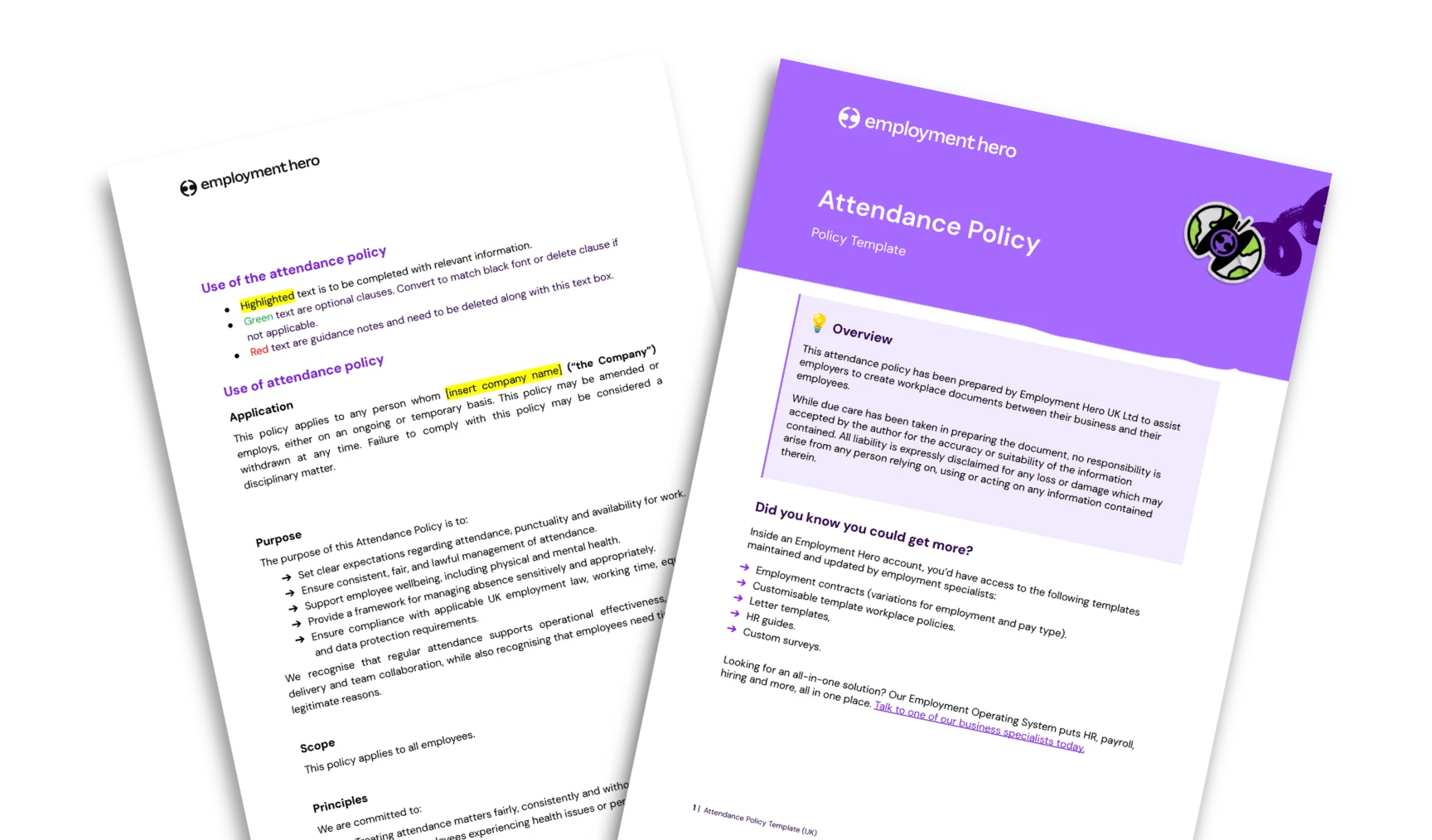Gross vs net salary: What UK Employers Need to Know
Published
Gross vs net salary: What UK Employers Need to Know
Published
As a business owner, leader, HR professional or payroll professional, understanding the difference between gross vs net salary is essential. And it’s more than just a finance concern; it’s key to compliance, transparency and employee trust.
Businesses who grasp the distinction can budget more accurately, avoid payroll surprises and present salaries in a way that attracts and retains top talent.
We’ll dive into gross vs net salary, how each is calculated in the UK, why both figures matter in different contexts and how to factor in the employer’s true cost of hiring.
What is gross salary vs net salary?
Understanding the difference between gross vs net salary is fundamental for every UK business. These two figures might appear side-by-side on an employees payslip, but they tell very different stories about pay: one shows the headline amount you agree to pay an employee, the other shows what they actually take home after deductions.
Getting these definitions right is crucial for everything from writing accurate job adverts to budgeting for payroll, handling statutory entitlements and supporting employee financial wellbeing.
What is gross salary?
Gross salary (or gross pay) refers to the full contractual amount an employer agrees to pay an employee before any statutory or voluntary deductions are made.
It includes:
- Basic salary or hourly wage.
- Overtime payments.
- Bonuses and commissions.
- Shift allowances or on-call payments.
- Other taxable benefits such as tips or certain allowances.
Gross salary is usually the figure quoted in:
- Offer letters and contracts of employment.
- Job advertisements (e.g., “£32,000 per annum”).
- Internal pay-band documentation.
Because gross pay is the pre-deduction amount, it forms the basis for statutory entitlements such as sick pay, holiday pay, maternity/paternity pay and is also the starting point for calculating tax and National Insurance (NI).
What is net salary?
Net salary, sometimes called take-home pay, is the amount an employee actually receives in their bank account after all mandatory and voluntary deductions are subtracted from their gross pay.
Common deductions in the UK include:
- PAYE income tax.
- Employee National Insurance contributions (NICs).
- Pension contributions (like auto-enrolment)
- Student loan repayments.
- Child maintenance or attachment orders, where applicable.
For employees, net salary reflects what they can realistically budget with each pay period. For employers, it’s important to communicate that deductions are applied fairly and in compliance with HMRC rules.
Calculating gross and net pay in the UK
Knowing what gross vs net pay are is only half the challenge. For business owners, HR managers and payroll professionals, knowing how to calculate both is essential. So let’s break it down.
How to calculate gross pay
Gross pay can be calculated using straightforward formulas:
- Hourly staff:
Gross pay = Contracted hours × Hourly rate
(e.g., 160 hours × £12/hour = £1,920 gross for the month) - Salaried staff:
Gross pay per period = Annual salary ÷ Number of pay periods per year
(e.g., £36,000 ÷ 12 = £3,000 gross per month) - Add any overtime, bonuses or allowances to the base figure to reach total gross pay for the period.
How to calculate net pay from gross
Net pay is derived by subtracting all deductions from gross pay. For most UK employees, deductions include:
- PAYE income tax – calculated on taxable income above the personal allowance.
- Employee NICs – usually Class 1 contributions based on earnings thresholds.
- Pension contributions – typically a % of qualifying earnings.
- Student loan repayments – Plan 1, Plan 2, Plan 4 or postgraduate loan deductions if applicable.
- Any salary-sacrifice schemes or court-ordered deductions.
Example (simplified):
Gross monthly salary: £3,000
- Income tax: £250
- NICs: £210
- Pension: £90
Net pay: £2,450
Tip: Payroll software such as Employment Hero can automatically handle PAYE calculations, saving time and ensuring compliance.
Why is gross pay important?
Employers need to understand gross pay because it drives key business and compliance processes:
- Contracts and offers: UK employment contracts are legally required to state gross pay.
- Budgeting and forecasting: HR and finance teams use gross pay to project payroll costs.
- Employer NIC calculations: Employer contributions to NIC and pensions are based on Niable earnings.
Clearly defining gross pay in contracts also protects against misunderstandings or disputes later.
Why is net pay important?
Net pay matters most from the employee’s perspective, it’s what actually lands in their account. But for employers, it’s equally crucial in these areas:
- Employee financial wellbeing: Transparent net pay helps staff plan household budgets.
- Recruitment transparency: Job adverts that include estimated take-home pay can attract more candidates.
- Retention: Employees who understand their payslips and trust the deductions process are less likely to raise disputes or feel undervalued.
- Payroll queries: Accurate net pay calculations reduce complaints and time spent on payroll adjustments.
Providing easy-to-understand payslips and guidance on deductions helps to foster trust and reduce HR admin.
The employer’s true cost of employment
It’s essential to remember that gross vs net salary doesn’t show the full cost of employing someone. Employers must also budget for:
- Employer’s National Insurance contributions.
- Employer pension contributions.
- Apprenticeship Levy (for eligible employers).
- Other benefits (e.g., healthcare, insurances, training).
For example, an employee with a gross annual salary of £35,000 could cost an employer over £38,000–£40,000 once these contributions are included.
Understanding the total employment cost helps organisations forecast accurately and prevents budget overspend.
Using gross vs net salary in recruitment and retention
Being clear about gross vs net salary plays a key role in recruitment marketing and employee experience:
- Accurate job adverts: Quoting gross pay is standard, but adding a net-pay example or range can boost transparency.
- Competitive offers: Knowing the employer’s on-costs allows you to benchmark properly against competitors.
- Employee trust and retention: Open communication about deductions reduces confusion and builds credibility.
- Employer branding: Businesses that are upfront about pay earn a reputation for fairness, which is an important factor in attracting top talent.
Employers who understand both figures can offer competitive compensation packages without risking profit margins or employee dissatisfaction.
Download your gross vs net salary template
Understanding gross vs net salary is not only a payroll obligation but also a strategic tool for better workforce planning, budgeting and employee trust. UK employers who master these concepts can communicate pay clearly, stay compliant with HMRC and strengthen their employer brand in a competitive labour market.
To download the guide, we just need a few quick details.
Related Resources
-
 Read more: How to Build an Employee Attendance Policy in 2026
Read more: How to Build an Employee Attendance Policy in 2026How to Build an Employee Attendance Policy in 2026
Learn how to create a fair and effective employee attendance policy in 2026. Discover strategies for managing attendance policies that…
-
 Read more: EOFY HR Audit: What to Review in March
Read more: EOFY HR Audit: What to Review in MarchEOFY HR Audit: What to Review in March
Complete a EOFY HR audit with our practical checklist. Review compliance, people processes and compliance to reduce risk before the…
-
 Read more: How to Choose an HR System: A 2026 Buyer’s Checklist
Read more: How to Choose an HR System: A 2026 Buyer’s ChecklistHow to Choose an HR System: A 2026 Buyer’s Checklist
HR software is more than features. Discover how the right system can streamline operations, boost efficiency and future-proof workforce management.



















